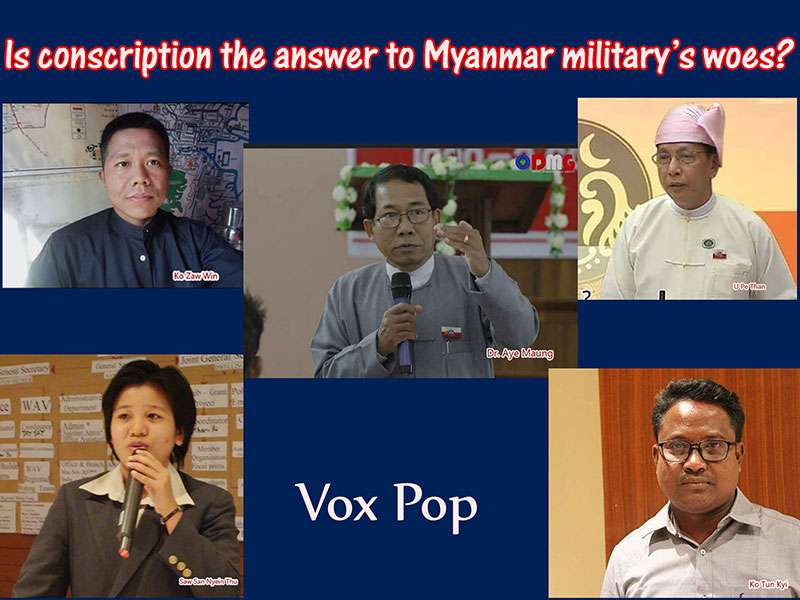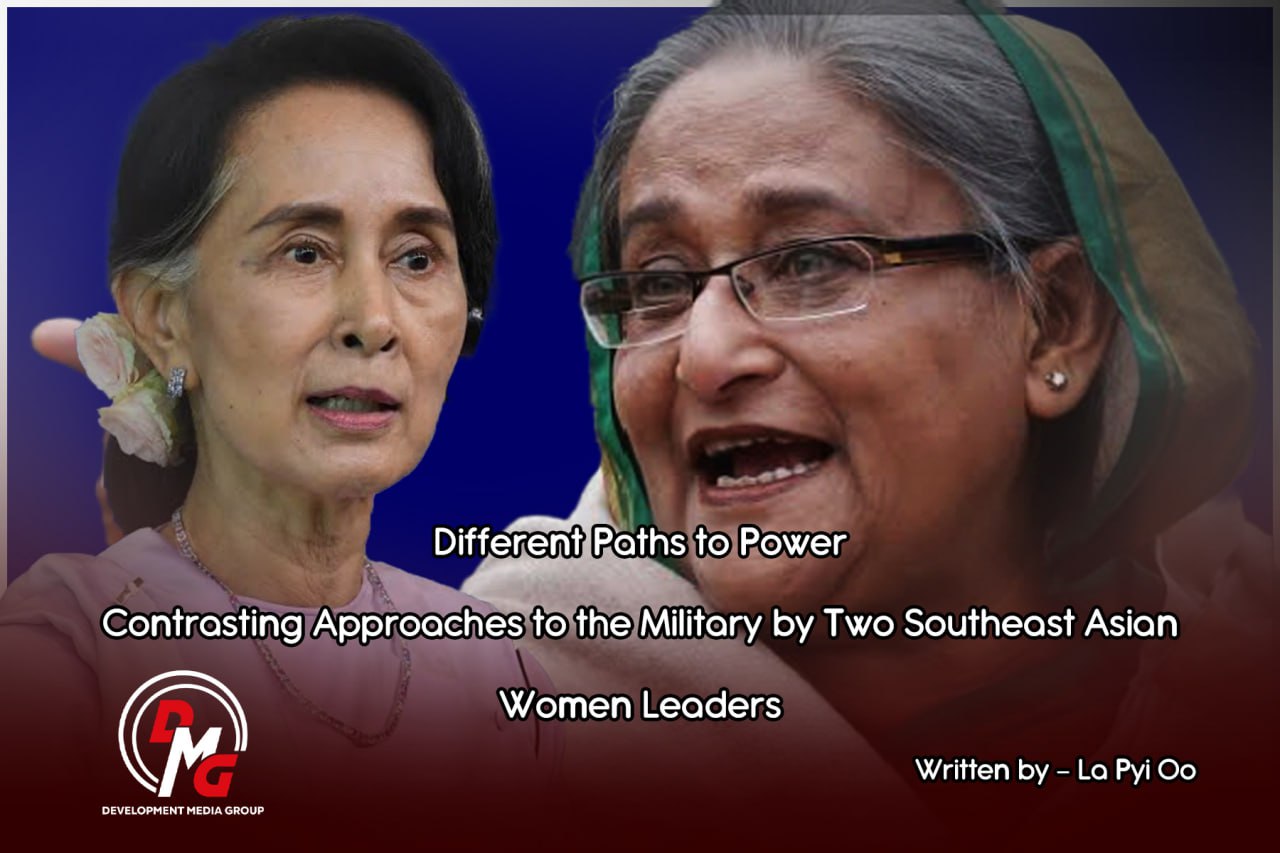- Children in Arakan State face rising cases of pneumonia and flu
- Muslim militiamen flee junta camps in Sittwe amid oppression, discrimination
- Junta navy activities halt fishing in Thandwe
- Junta airstrike kills 21 POWs, family members at Kyauktaw detention centre
- Arakan Army seeks to expand territorial control in Sittwe
Vox Pop: Is conscription the answer to Myanmar military’s woes?
Junta chief Senior-General Min Aung Hlaing said last week that his regime would push for implementation of a law requiring all Myanmar citizens to serve in the military. The announcement said enforcement of legislation that was passed more than a decade ago would be a priority of his administration this year.
06 Feb 2022

DMG Newsroom
6 February 2022
Junta chief Senior-General Min Aung Hlaing said last week that his regime would push for implementation of a law requiring all Myanmar citizens to serve in the military. The announcement said enforcement of legislation that was passed more than a decade ago would be a priority of his administration this year.
The focus on conscription comes as the military is facing unprecedented strain on its control over the country. Conflict has flared anew or intensified with several ethnic armed groups in Myanmar’s border regions, and dozens of new anti-regime People’s Defence Forces have formed to wage war against the junta in the aftermath of the military coup on February 1, 2021.
Against this backdrop, DMG interviewed politicians and local Arakan State residents about the conscription plans of Senior-General Min Aung Hlaing.
U Pe Than || Former Arakan State lawmaker
I heard Senior-General Min Aung Hlaing’s speech. Senior-General Min Aung Hlaing says the conscription law will be applied within a year to boost the country’s economy and bring about multi-party democracy. He has been in power for some time now, and since the election will take place next year, why is it necessary to do some really long-term work within a year?
Do we need to expand our military forces? Do we need to implement a law that requires a lot of new soldiers to serve in the civil war? Now even anti-regime forces [PDFs] are included in the fight against the Myanmar military. Is [the plan to implement a conscription law] because there are not enough people joining the army?
There is no reason for Myanmar to go to war with foreign countries. Internationally, wars between nations are rare. Our country is an ordinary country. I think it is not appropriate to ‘protect the country’ by enacting this conscription law, given the economic and political situation of our country.
Ko Zaw Win || Kyauktaw Township resident
Two things occurred to me when Senior-General Min Aung Hlaing called for a conscription law. The first is that they don’t have enough military power because the whole country is armed against the military dictator. It indicates that the Myanmar military doesn’t have the troops to fight back against ethnic armed organisations and anti-regime forces. Another thing is that I am positive about the fact that the coup leader has announced that he will enact a conscription law; because, for example, during the fighting in Arakan State, U Zaw Htay, the NLD [National League for Democracy] government’s spokesperson, warned Arakanese people not to have ties to the Arakan Army, [inadvertently] making Arakanese people more united.
As the Arakanese people sided with the Arakan Army, the ethnic armed organisation became stronger. In other words, those in power do not know how to speak. No one wants to join the Myanmar military, so when [the junta leader] says they must join the army, his words seem to push them to the other side. Ethnic people will only join their tribal armed forces because of the conscription law.
Ko Tun Kyi || Kyaukphyu resident
Article 386 of the 2008 Constitution stipulates that all citizens must receive military training in accordance with the law, but this has not been enacted as a law during the past 10 years. It is very unlikely that the military council will now say that every citizen should serve in the military, because I think this is something that can only be done after the law is enacted.
To be sure, given the current situation in Burma, if the conscription law is enacted, only the revolutionary forces will grow stronger. The military council’s army has very little chance of gaining strength. Today, the majority of the people are on the side of the just cause of the revolution. I think the military council’s statement that all citizens over the age of 18 should serve in the military is tantamount to strengthening revolutionary groups.
Saw San Nyein Thu || Chairwoman || Rakhaing Women’s Initiative Organization
The military council is working to pass a conscription law at the moment, which is not the right time to do so. I think it is especially important to have a political process that discusses how to build a truly democratic federal union, along with the peace process after the ceasefire. I think it is important to hold political talks that include all non-signatories to the Nationwide Ceasefire Agreement (NCA) and signatories to the NCA.
In the meantime, the return of political instability following the coup d’état should put the focus on how to stabilise the current political situation, and how to build a federal union. I think any law that requires all citizens to serve in the military — only after the country has achieved stability and development — should be discussed in a participatory manner.
Dr. Aye Maung || Former lawmaker
The conscription law was drafted as a people’s war strategy during former dictator U Than Shwe’s reign. The [basis for the] conscription law is also included in the Constitution. Since Senior-General Min Aung Hlaing may have promulgated the conscription law, there is a high probability that it will be enacted at present. [Comparable] military service laws seem to have been enacted in many other countries as well.
It is also possible that the conscription law will be enacted due to political and military needs, as it is already enshrined in the 2018 Constitution. Compulsory military [service] laws take into account the security of a country. The military council is currently working for peace with the ethnic armed groups and on how to end the civil war.





.jpg)














